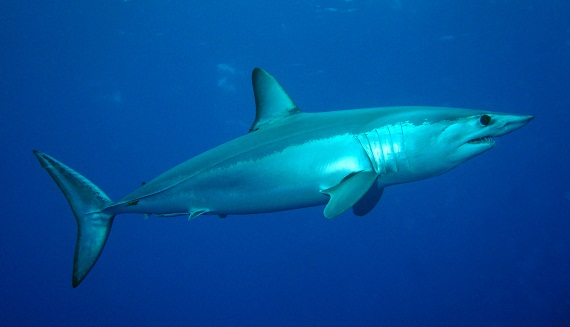
A male mako shark is being dubbed the “Energizer Bunny” after traveling a distance of half the globe, or 13,000 miles (just over 21,000 km), in less than two years. According to researchers at the Nova Southeastern University's (NSU) Guy Harvey Research Institute (GHRI), it is the longest track recorded in the Atlantic Ocean by a tagged mako shark.
The scientists began monitoring the shark, named Hell’s Bay, in May 2015. In the first year, he traveled north along the east coast of the US before returning to the tagging site off the coast of Ocean City, Maryland. In 2016, the shark made several round-trip journeys throughout the Atlantic, traveling east past Nova Scotia and as far south as Bermuda. This year, the shark appears to be repeating the travel pattern but is staying closer to the coast.

The researchers say Hell’s Bay’s jaunts over the past two years have allowed them to identify clear seasonal patterns. The mako shark spends the winter and early spring far offshore and the rest of the year on or near the continental shelf.
While Hell’s Bay certainly deserves an award for the impressive mileage, Mahmood Shivji, the Director of GHRI, says one of the reasons it was able to do so is because he is still alive. In December 2016, the non-profit reported that a female shark, tagged about the same time as Hell’s Bay, had become a victim of a commercial long-line fishing boat. Before her unfortunate death, the shark managed to cover an impressive 8,500 miles over the 557 days the team had been tracking her. And, she is not alone. A recent GHRI study found that 22% of the tagged makos had been captured or killed by commercial or recreation fishermen.
Mako sharks, one of the fastest sharks in the ocean, can swim at speeds of 45 miles per hour while in pursuit of prey. Their rapid pace allows them to attack humans without warning, which is why the sharks are so feared and often killed.

Unfortunately, the situation is as dire for other members of the shark family as well. Experts estimate that between 70-100 million sharks are killed by humans each year. Given their low reproduction rate, this does not bode well for the species, many are whom are already on the endangered list. Hopefully, information gleaned from sharks like Hell’s Bay will enable researchers to educate the public on ways to protect these majestic animals for future generations.
Resources: phys.org, sharks-world.com